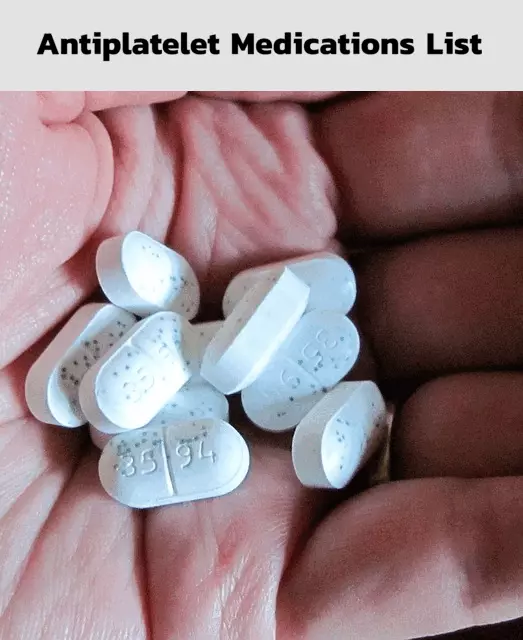Platelets are tiny cell fragments found in the bloodstream that have a vital function of creating clots to prevent bleeding.
Antiplatelet medications, such as aspirin, clopidogrel, and ticagrelor, act by interfering with the platelet activation process, preventing platelets from sticking together and forming clots. These medications are often prescribed for individuals with a history of cardiovascular diseases, such as heart attacks or unstable angina, or those who have undergone procedures like coronary stent placement or coronary artery bypass graft surgery.
Antiplatelet Medications List
Here is a list of commonly used antiplatelet medications:
- Aspirin: This is one of the most widely used antiplatelet medications and is available without a prescription. It inhibits the production of certain chemicals in the body that promote blood clotting.
- Clopidogrel (Plavix): This medication is often prescribed alongside aspirin for individuals who have had a heart attack, stroke, or peripheral arterial disease.
- Prasugrel (Effient): Prasugrel is another antiplatelet medication that is used in certain cases, such as in patients who have undergone a procedure like angioplasty or stenting.
- Ticagrelor (Brilinta): This medication is commonly used in the treatment of acute coronary syndrome, including unstable angina and heart attack. It works by inhibiting the activation of platelets.
Use of Antiplatelet Medications
Healthcare professionals prescribe these medications according to an individual’s unique condition and potential risks. Typically, they are utilized for the following objectives:
- Preventing blood clots: Antiplatelet medications are an essential part of preventing blood clot formation, particularly in individuals with a high risk of developing cardiovascular events such as heart attack or stroke.
- Managing heart conditions: These medications are often prescribed to individuals with a history of heart conditions, such as those who have undergone heart procedures or have certain heart diseases.
- Preventing complications after certain procedures: Antiplatelet medications are also used to prevent blood clots after procedures such as angioplasty or stent placement.
Nonetheless, people with certain medical issues or those who have undergone particular treatments can experience abnormal clotting, which can result in severe health issues like heart attacks or strokes.
FAQ About Antiplatelet Drugs
1. What are the most common antiplatelet drugs?
The most common antiplatelet drugs include:
- Aspirin
- Clopidogrel (Plavix)
- Prasugrel (Effient)
- Ticagrelor (Brilinta)
These drugs are often prescribed to prevent blood clots from forming, which can reduce the risk of heart attack and stroke.
2. What are OTC antiplatelet drugs?
Over-the-counter (OTC) antiplatelet drugs are medications that can be purchased without a prescription. The most notable OTC antiplatelet drug is:
- Aspirin (various brand names)
Aspirin is used not only for pain relief but also in a low dose to prevent blood clots.
3. What are the oral antiplatelet drugs?
Oral antiplatelet drugs are those taken by mouth to inhibit platelet aggregation and prevent clots. These include:
- Aspirin
- Clopidogrel (Plavix)
- Prasugrel (Effient)
- Ticagrelor (Brilinta)
- Cangrelor (Kengreal), which is an IV formulation but has a similar mechanism.
4. What are the latest antiplatelet drugs?
Recent advancements in antiplatelet drug development have led to the introduction of newer medications and the optimization of existing therapies. Some of the latest options may include updated formulations of existing drugs or newer medications being studied in clinical trials. Information about the latest drugs is best acquired directly from recent scientific research or updates from drug regulatory agencies.
5. What is the duration of antiplatelet drugs?
The duration of antiplatelet drug therapy can vary significantly based on the condition being treated, the specific drug used, and the individual patient’s risk factors. Treatment durations can range from a few days post-surgery to a lifelong regimen for chronic conditions. Always follow the duration recommended by a healthcare provider.
6. Why are antiplatelets given at night?
Antiplatelets may be given at night for several reasons:
- The body’s natural processes for forming blood clots are more active during sleep, so taking an antiplatelet drug at night may provide better protection against early morning cardiovascular events.
- Certain antiplatelet drugs may have a more pronounced effect on platelet activity during the early hours of the morning.
- Patient adherence can be improved when medications are taken as part of a routine, such as nightly dosing.
It is important to follow the dosing recommendations provided by a healthcare professional, as they will determine the most appropriate timing based on the medication and individual patient factors.







